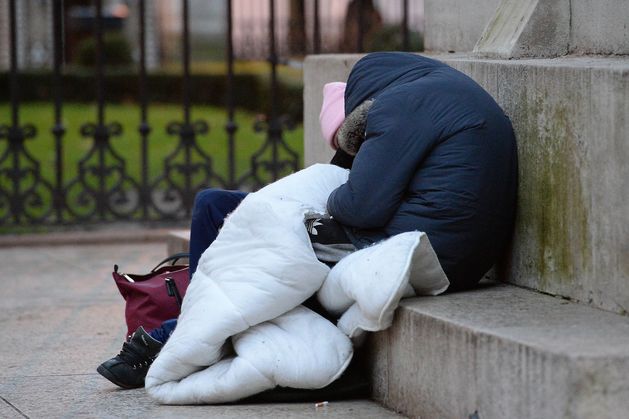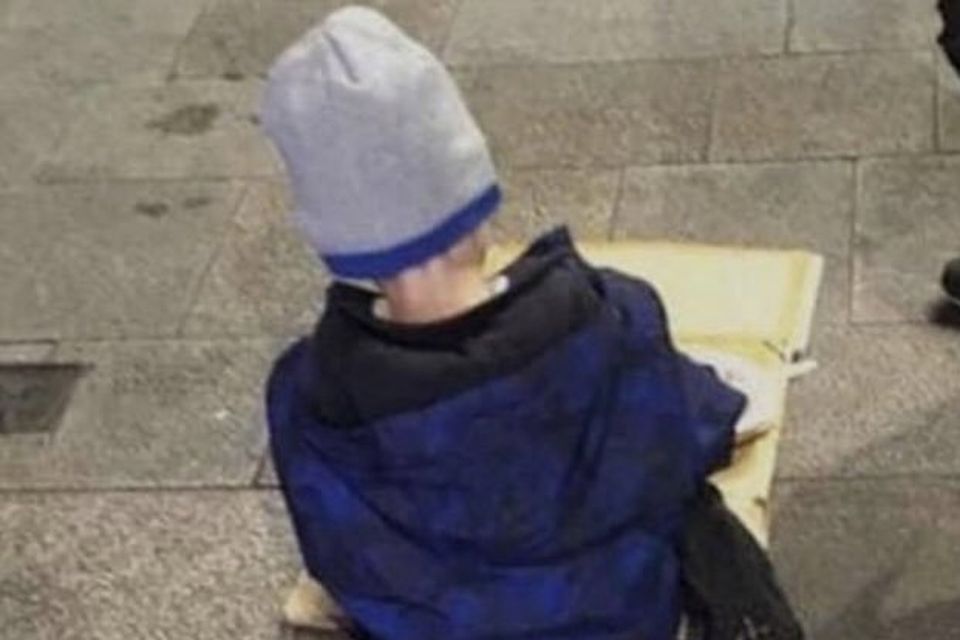There were 749 children in such housing across Ireland in July 2014, but this figure surged to reach 3,778 children within five years.
Despite a brief respite during the Covid-19 pandemic, there were 4,404 children living in homeless accommodation in July 2024.
Less than a year later, yet another record has been broken. In March, there were 15,418 people relying on emergency homeless accommodation, including 4,675 children.
There are many reasons why figures have continued to climb over the last 11 years, including a lagging impact of the recession in the early 2010s, issues in the private rental market and the lack of social and affordable housing.
It has felt as if there have also been watershed moments over the years that had the potential to turn things around, breaking points that somehow failed to inspire policy that would buck the trend of rising homelessness.
A poignant image of a five-year-old boy in a woolly hat, kneeling on the street as he ate his dinner from a piece of cardboard in Dublin, went viral in 2019.
Sinn Féin TD Pearse Doherty told the Dáil at the time that child homelessness had become “a national shame”.
This photo of a homeless boy named Sam went viral in 2019 when published online by Dublin volunteer group The Homeless Street Cafe
The annual spend on homelessness services has almost doubled since 2019, rising to €303m following the last Budget.
When the pandemic struck, overall homelessness figures dropped just months after another milestone of 10,000 people living in emergency homeless accommodation had been surpassed.
There were 7,991 people accessing emergency homeless accommodation in 2021, the lowest in four years. These figures do not include the number of people rough sleeping or living in “hidden” homelessness, such as couch surfing.
The number of children living in emergency homeless accommodation decreased to 2,129, the lowest since 2016. There was hope among many working in the sector that it marked a turning point in tackling family homelessness.
“We had a couple of years of falling family homelessness and people working very closely together during Covid-19,” said Focus Ireland advocacy director Mike Allen, who blamed evictions by private landlords as one of the “driving forces” of family homelessness.
Today’s News in 90 Seconds – May 3rd
He said the introduction of the no-fault eviction ban and accelerated exits from emergency accommodation during the pandemic allowed for a “remarkable fall” in figures between 2020 and 2021.
“There was very definitely a sense of optimism, that we now knew what worked – a mixture between prevention, making sure people are less likely to become homeless, and targeting people for routes out of homelessness. [We thought], ‘If we can continue those in some way, we will actually continue this downward graph.’”
But, it did not last. By last May, figures had doubled and hit more than 4,000 children for the first time – significantly higher than it was at the highest point before the pandemic.
More families were now homeless than ever before and more of them would be homeless for longer periods of time, said Mr Allen.
“For staff and people working in the area to see family homelessness fall – and all the hope and the possibility there was – and then to watch it rise inexorably after that…it’s hard to keep the morale. It’s crucial our staff can convey a sense of hope to the families themselves, and it’s very hard when they’re looking at the way the Government has handled this.”
It’s a fear that some of the children we’re working with now, who are homeless with their families, we might be seeing them in years to come
He said successive governments had underestimated the scale of the problem and what needed to be done to resolve it, which he said should include higher social housing targets and measures that would address long-term homelessness.
“The fear that is in the back of people’s minds who work in these areas is that we know from international – mostly American – work, that experiencing homelessness when you’re a child increases your risk of experiencing homelessness as an adult.
“It’s a fear that some of the children we’re working with now, who are homeless with their families, we might be seeing them in years to come – homeless because of the disruption that happens to their lives and the trauma that’s been caused”.
Children’s charity Barnardos has also seen a “huge increase” in the number of families who need support in relation to housing and homelessness, with policy manager Stephen Moffatt saying some children spend a “chunk of their childhood” in emergency accommodation, which can have a lasting effect.
Children may have to “give up their bedroom or their pets, give up most of their possessions because there’s not enough space” when they are moved, perhaps somewhere quite a distance from their previous home. While parents do their “utmost” to shield them from the stress, anxiety and uncertainty, it can have a knock-on impact.
Telling them that in five years’ time, hopefully, we’ll have more social housing – their childhood will be over at that stage and the damage will have been done
Mr Moffatt said there must be a greater focus on preventative services, while addressing long-term goals such as increasing the number of homes.
“The children living in emergency accommodation right at this moment, telling them that in five years’ time, hopefully, we’ll have more social housing – their childhood will be over at that stage and the damage will have been done,” he said.
In response to queries, a spokesperson for the Department of Housing said resolving the current homelessness crisis “remains a top priority and key to addressing homelessness is increasing the supply of housing”.
The Budget allocation of €303 million would “provide homeless prevention services, emergency accommodation and other services for households experiencing homelessness”, including funding for 36 family hubs.
“While hubs are emergency accommodation, they provide a greater level of stability than is possible in emergency hotel accommodation, with the capacity to provide appropriate play-space, cooking and laundry facilities, and communal recreation space, while move-on options to homes are identified and secured. More intensive assistance in terms of welfare, health and housing services are also supplied through family hubs.”
The spokesperson said the Programme for Government 2025 had set out a number of commitments in addressing family homelessness, while a pilot to provide accommodation to families with complex needs and experiencing long-term homelessness in Galway had begun under Housing for All last year.
If you have been affected by any of the issues in this article, call Focus Ireland on 01 881 5900, email [email protected] or see focusireland.ie; or call Peter McVerry Trust on 01 823 0776, email [email protected] or see pmvtrust.ie
#Dashed #hopes #boy #eating #dinner #street #crisis #child #homelessness #shape









